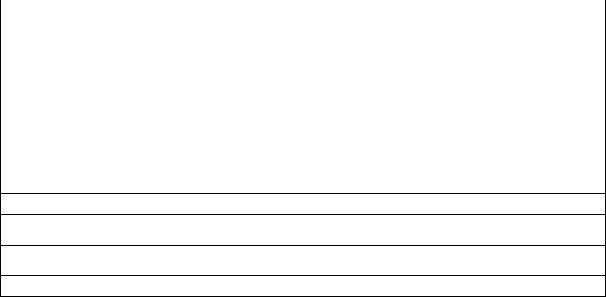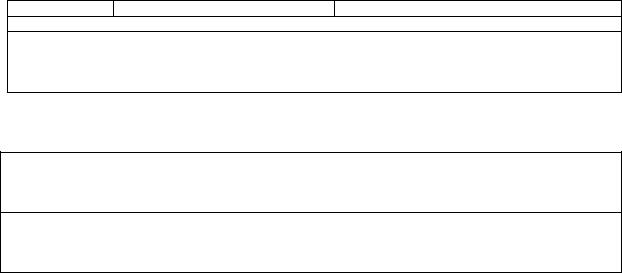
желтый
.pdfA would visit |
B would have visited |
C will visit |
|||
4) |
If you ….. well, lie down for a while. |
|
|||
A hadn't felt |
B don't feel |
C didn't feel |
|||
5) |
Ice ….. if the temperature rises above 0°C. |
||||
A will melt |
B would melt |
C melts |
|||
6) |
Had I known about the meeting, I ….. it. |
||||
A would have attended |
B attended |
C will attend |
|||
7) |
If he ….. in the garden, he would have heard the doorbell. |
||||
A isn't |
B was |
C hadn't been |
|
||
8) |
I ….. to the bank manager if I were you. |
||||
A would talk |
B will talk |
C talked |
|||
EXERCISE 5. Rewrite the sentences, as in the example.
Example: He doesn't know her. That's why he didn't speak to her.
If he knew her he would have spoken to her.
1.She doesn't have a mobile phone. That's why she couldn't be contacted yesterday.
2.Tom didn't see the boss earlier. He's waiting for him now.
3.He is allergic to seafood. That's why he didn't eat paella last night.
4.I lost my map. That's why I'm asking for directions now.
5.She doesn't speak French. She didn't have a good time in Paris.
6.He lost the race. He is not a champion now.
7.She didn't go to the bank yesterday. That's why she hasn't got any money now.
8.They went to a party last night. That's why they are tired now.
9.I crashed my car. That's why I'm taking the bus today.
EXERCISE 6. Translate into English.
1.- Будь она моей сестрой, я бы нежно ее любила. – Правда? 2. Если бы она умела хорошо готовить, то ее муж был бы счастлив. 3. Если бы я жил в Африке, то ел бы одни фрукты: бананы, апельсины, киви. 4. Будь он более энергичным, то давно мог бы сделать отличную карьеру. 5. Мы были бы очень признательны, если бы вы извинились. 6. Если ты будешь стирать свою майку в горячей воде, то она сядет и полиняет. 7. Розы стояли бы гораздо дольше, если бы ты добавила в воду две столовые ложки сахара. 8. Если бы она носила короткие юбки, то выглядела бы моложе. 9. Если бы ему были нужны деньги, то он мог бы обратиться к нам. 10. Не будь дело таким серьезным, Давид не нанял бы частного сыщика. 11. Когда она узнает результат, то не поверит, что ей так повезло. 12. Если бы не запутанные обстоятельства, детектив сумел бы найти преступника намного раньше.
92

Wishes
|
Form |
Use |
I wish (if only) (regret about the |
+ Past Simple |
regret about a present situation |
present) |
|
which we want to be different |
I wish I were/was more patient. (It’s a pity. I’m not patient enough.) |
|
|
I wish (if only) (wish/ regret |
+ subject + could + bare inf. |
wish or regret in the present |
about the present) |
|
concerning lack of ability |
I wish I could ride a bicycle. (But I can’t.) |
|
|
I wish (if only) (impossible wish |
+ subject + would + bare inf. |
Wish for a future change unlikely |
for a future change) |
(-“wish” and “would” should have |
to happen or wish to express |
|
different subjects. |
dissatisfaction; polite request |
|
-wish + inanimate subject + would is |
implying dissatisfaction or lack of |
|
used to express the speaker’s lack of hope |
hope |
|
or disappointment.) |
|
I wish he would study forhis exams. (But I don’t thinkhe will. – wish for a future changeunlikely to happen) I wish Jane would go to university. (Jane has refused to do so and I’m unhappyabout it. - dissatisfaction)
I wish you would be quiet. (Please be quiet; but I don’t expect you will. – request implying lack of hope) I wish it would stop snowing. (But I’m afraid it wouldn’t stop snowing – wish implying disappointment)
I wish (if only) (regret about the |
+ Past Perfect |
Regret that something happened |
past) |
|
or didn’t happen in the past |
I wish I had gone to Ann’s party last night. (But I didn’t– It’s a pity I didn’t go.)
In wishes we go one tense back. This means that we use Past Simple in the present and Past Perfect in the past. I’m poor. I wish I were rich.(present) I lost my watch yesterday. I wish I hadn’t lost it. (past)
After I wish we can use were instead of was in all persons. I wish I was/were taller. If only means the same as I wish but it is more dramatic. If only I was/were taller.
EXERCISE 7. Explain the relative use of the tenses in the following sentences.
1. Kate wished her boyfriend were more attentive to her. 2. Now she wishes she had agreed to marry him. 3. We wish it would rain. It’s too hot. 4. I wish you wouldn’t talk about that, Dad. 5. She wishes she were in love again. 6. I wish you would stop contradicting me! 7. We wished the police were more efficient and hadn’t just turned everything upside down in the house. 8. I wish I could change his mind! I wish he would give up that silly idea. 9. Sometimes I wish I were thousands of miles away from civilization. 10. Many people wish life were not so hectic.
EXERCISE 8. Using the sentences, write wishes as in the example:
1.You are living for the airport. You can’t find your passport. You say: “I wish I could find my passport.”
2.You live in the suburbs. You prefer the city centre.
3.You argued with your mother yesterday. Today she is upset.
4.You didn’t clean your bedroom and your mother is angry.
5.You want to go on holiday but you can’t afford it.
EXERCISE 9. Rephrase the following sentences using the beginnings given.
1. You’d better see a doctor. = If I were you, I’d see a doctor.
93

2.He won’t help you if you don’t ask him. = Unless … .
3.Take your medicine, otherwise you won’t get better. = If … .
4.You won’t make any spelling mistakes provided you use a dictionary.=If …
5.If you park here, you’ll be fined Ј20. = Don’t … .
6.You’d better confess your crime. = If … .
7.She went home early because she was exhausted. = If … .
8.You won’t understand the story unless you finish the book. = If … .
9.She can’t go out if she doesn’t promise to be back early. = Unless … . 10.The bee won’t sting you as long as you stay still. = Provided… .
EXERCISE 10.Translate into English.
1. Хотелось бы, чтобы люди были более дружелюбными. 2. Жаль, что люди так напряжены. 3. Хорошо бы он позвонил мне вечером. 4. Напрасно я позвонила ему первой. 5. Жаль, что Петр не умеет работать компьютером. 6. Зря я научилась работать на компьютере. Это как наркотик. 7. Хотелось бы, чтобы этот психолог не испытывал свои методы на моем ребенке. 8. Напрасно я не принял это лекарство от головной боли. 9. Жаль, что Нина не всегда искренна со мной. 10. напрасно вы были так откровенны. Ведь он наш конкурент. 11. Как жаль, что она не умеет петь. 12. Я бы хотела, чтобы мой день рождения длился и длился, и чтобы я всегда была также счастлива! 13. Жаль, что он не смог предупредить нас, что это дело очень рискованное.
REPORTED SPEECH: Level B
Direct speech is the exact words someone said. We use quotation |
“I go to Moscow,” she said. |
|
marks in Direct speech. |
|
|
Indirect speech is the exact meaning of what someone said but |
She said she would go to Moscow. |
|
not the exact words. We do not use quotation marks in Reported |
|
|
speech. |
|
|
SayTell |
|
|
|
|
|
We use say/tell in reported speech. |
|
|
|
|
|
Expressions with say |
Say good morning/evening etc, say something, say so etc |
|
|
|
|
Expressions with tell |
Tell the truth, tell a lie, tell sb the time, tell sb one’s name tell a story, tell a |
|
|
secret, tell sb the way, tell one from another etc |
|
We can report statements, questions, commands, requests, suggestions
Reported statements
To report statements we use a reporting verb (say, tell, explain etc) followed bya that-clause. In spoken English that can be omitted. He said “I feel sick.” He said (that) he felt sick.
Pronouns and possessive adjectives change according to the context
He said, “I’ll lend you my car”- He said he would lend me his car.
Time words and tenses can change depending on the time reference:
94

Direct speech |
Reported speech |
|
|
Tonight, today, this week/month/year |
That night, that day/week/month/year |
Now |
Then, at that time, at once, immediately |
Now that |
Since |
Yesterday, last night/week/month/year |
The day before, the previousday/week |
Tomorrow, next day/week |
The following day/the day after/ the following/the next |
|
week/month/year |
Two days/months/years ago |
Two days/weeks/monthsbefore |
“Tom is leaving tomorrow,” she said.She said Tom was leaving the next day (Speech reported after Tom had left.)
“Bob is leaving tomorrow,” she said.She said Bob is leaving tomorrow. (Speech reported before Bob has left.)
Certain words change as follows depending on the context. Direct speech: this/these here come
(in his office) He said, “I’ll be here again on Monday.”
Reported speech: that/those there go
(outside the office) He said he’d be there again on Monday.
There are no changes in the verb tenses in Reported speech when the direct sentence expresses a general truth, is Conditional Type 2 or Type 3 or a wish.
“The earth is a planet,” she said. – She said the earth is a planet. (general truth)
“If you studied more, you’d pass your test, he said.” – He said that if I studied more, I’d pass my test. “I wish I was/were rich,” he said.– He said he wished he was/were rich.
When the introductoryverb is in the Present, Future or Present Perfect, there are no changes in the verb tenses.
“Kate can write,” she says. – She says that Kate can write.
The verb tenses can change or remain the same in Reported speech when a sentence expresses something which is up to date or still true. However, the verb tenses usually change when something is not true or out of date. “I like ice-cream,” he said. – He said he likes/liked ice/cream. (still true)
“I am rich,” he said. – He said he was rich. (but we know heisn’t; not true)
Reported Commands/Requests/Suggestions
|
To report commands, requests, suggestions etc we use a reporting verb (advise, ask, suggest, beg,offer, tell |
|
|
|
etc) followed by a to-infinitive, a not to-infinitive or an –ing form according to the construction of the |
|
|
|
introductoryverb. |
|
|
|
Direct speech: |
Reported speech: |
|
|
He said to me, “Come with me.” |
He told me to go with him. |
|
|
He said to me, “Don’t lie to me” |
He told me not to lie to him. |
|
|
He said, “Let’s go out” |
He suggested going out. |
|
|
Modals in Reported speech |
|
|
|
|
|
|
|
There are changes in the verb tenses of some modal verbs in Reported speech: |
|
|
|
|
|
|
|
Direct speech |
Reported speech |
|
|
|
|
|
|
She said, |
She said |
|
|
“I’ll do it later.” |
(that) she would do it later. |
|
|
“I can speak French” |
(that) she could speak French |
|
|
“I can come next Tuesday” |
(that) she would be able to go next Tuesday. |
|
|
“I may speak to Bob” |
(that) she might speak to Bob |
|
|
“You must be back at 10.00.” |
(that) I must/had to be back at 10.00.(obligation) |
|
|
“He must be a liar.” |
(that) he must be a liar.(deduction) |
|
|
“You should try harder” |
(that) I should try harder. |
|
|
“You had better phonehim” |
that I had better phonehim. |
|
|
“How shall I do this?” |
Sheasked how she should do that.(advice) |
|
|
“When shall we reach London” |
Sheasked when they would reach London.(information) |
|
Would, could, used to,mustn’t, should,might, ought to and had better remain the same.
Reporting a dialogue or conversation
95

In conversation we use a mixture of statements, commands and questions. When we turn them into the Reported speech we use: and,as, adding that, and he/she added that, explaining that because, but, since, and then he/she went on to say, while, then etc or the introductory verb in present participle form. Words and expressions such as Oh, Oh dear, Well etc are omitted in Reported speech.
Direct speech: |
Reported speech: |
“Oh, this is a very nice dress,” she said. |
She remarked/exclaimed that that was a very nice dress and she |
“How much does it cost?” “I can’t buy |
asked how much it cost. |
it, she said. “I can’t afford it.” |
She said she couldn’tbuy it, explaining that she couldn’t afford it. |
Introductory verbs
+ to-infinitive
Agree, claim,demand, offer, promise, refuse, threaten
“Yes, I’ll drive you home.” – He agreed to drive me home. “I’ve won $ 1,000,000.” – He claimed to have won $ 1,000,000.
+ sb + to-infinitive
Advise, ask, beg, command, encourage, forbid, invite, order, remind, warn
“You should eat less junk food.” – He advised me to eat less junk food. “Please, please don’t hurt me.” – He begged me not to hurt him.
+ -ing form
Accuse sb of, admit to, apologise for, boast about/of, complain (to sb)of, deny, insist on, suggest
“I’m sorry I broke your mug.” – He apologized for breaking my mug.. “No, I didn’t use your keys.” – Hedenied using/having used my keys.
+ that-clause
Explain, inform sb
“I liked his latest film because it was exciting.” – She explained that she liked his latest film because it was exciting.
“The manager will be back at noon.” – He informed us that the manager would be back at noon.
EXERCISE 1.Put the following statements into indirect speech.
1) 'Му young brother wants to bе а tax inspector,' said Mary. 'I can’t think why. None of my family has ever been а tax inspector.' 2) 'We're waiting for the school bus,' said the children. 'It's late again.' 3) 'I’ve made а terrible mistake!' said Peter. – 'You're always making terrible mistakes,' I said. 'You should bе used to it bу now.' 4) 'We make $ 450 а week,' said one of the men, 'and send most of it hоmе to our wives.' 5) 'Тhе ice will soon bе hard enough to skate оn,' said Тоm. 'I'll look for mу skates when I get hоmе,' Аnn said. 6) 'I'm living with mу parents at present,' she said, 'but I hоре to have а flat of mу own soon.' 7) 'I’m leaving tomorrow,' she said, 'bу the 4:30 from Victoria.' – 'We'll соmе and see you оff,' we said. 8) 'I’ve just bought а car,' said Peter, 'but it's not insured yet so I can't take you for а drive.' 9) 'I'd like to speak to Susan,' said Mary, 'but I'm bathing the babies and they will drown if I leave them alone in the bath while I go to the phоnе.' 10) 'Nothing ever happens in the village,' she said. 'It's like а dead village. Аll the young people have drifted away to the towns.'
EXERCISE 2.Put the following questions into indirect speech.
1.'Do you want to see the cathedral?' said the guide.
2.'What were you doing with these skeleton keys?' said Mr Jones.
96
3.'Were you trying to get at the secret files?'
4.'Did you sleep well?' asked my hostess.
5.'Наvе you been here long?' the other students asked him.
6.'Саn you tell mе why Paul left the university without taking his degree?' Paul's sister asked.
7.'How many people know the combination of the safe?' said the detective.
8.'Are there any letters for mе?' said Mary.
9.'How long have you been learning English?' the examiner said.
10.'Why aren't you taking the exams?' said Paul. 11.'Are these free-range eggs?' said the customer.
12.'Where are you going for your summer holidays?' I asked them.
13.'Will it bе аll right if I соmе in а little later tonight?' asked the аu pair girl. 14.'Наvе you ever seen а flying saucer?' said the man.
15.'Where саn I park mу caravan?' she asked the policeman. 16.'Would you like а lift?' said Ann.
17.'Which way are you going?' I said.
18.'Who do you want to speak to?' said the telephonist. 19.'Does anyone want tickets for the boxing match?' said Charles.
EXERCISE 3. Use the introductory verbs below to turn the following sentences into reported speech: accиse, claim, deny, admit, соmрlаin, insist оn, forbid, boast, encoиrage, demand.
1"You should enter the poetry competition," Ellen said to mе.
2"No, I didn't take уоur credit card," Rick said to Kim.
3"I have noisy dogs in mу neighbourhood," George said.
4"You cheated in the Maths test," Мr Nichols said to Mike.
5"You must clean your room tomorrow," Mum said to mе.
6"I'm the fastest runner of all," Саrl said.
7"Tell mе why you didn't do your homework," Mrs Reese said to Cindy.
8"I saw а tall mаn with blond hair break into the shop," Мr Parker said.
9"You mustn't drive mу саr without asking mе first," Dad said to mе.
10"Yes, I used your mobile phone," Мах said to Dоnnа.
11"You should tell your teacher what really happened," mу friend said to mе.
12"Why don't we play chess?" Jill said.
13"You must visit the Eiffel Tower when you аrе in Paris," Jack said to mе.
14"Put your gun down," the policeman said to the robber.
15"You used mу computer without asking mе," Mоm said to Lisa.
16"Would you like mе to make you something to eat?" Mum said to Rachel.
97
EXERCISE 4. Turn the following into reported speech. 1 "I'm tired," he said. "I didn't sleep properly last night."
Не said that he was tired, explaining that he hadn't slept properly the night before.
2 "It's cold in here," she said. "Shall I light а fire?" 3 Аnn: I must go. I'm late.
Dave: What's the hurry?
Аnn: I've got аn important meeting. It starts in twenty minutes. 4"Have you finished your report?" she said. "The boss wants it now." 5 Sam: Саn you help mе? I'm lost.
Gill: Where do you want to go?
Sam: I've got а meeting at the Town Hall. It's оn Regency Road. 6 "I’m bored,” said Kate. "Shall we go for a walk?"
7 Tom: I haven’t got time to have lunch today. Peter: Why not?
Tom: I’ve got a lot of work to do for the presentation. It starts at 3 o’clock.
EXERCISE 5. Fill in the correct form of say, tell, speak or talk. What other expressions go with say or tell?
1."Could you……me the time?" ….. the old lady.
2.He ….. me to ….. up because he couldn't hear me.
3."I'd like to ….. to the manager please," ….. the client.
4.Mr. Lawson ….. he could ….. French and Arabic.
5.I don't ….. to Bob anymore; he is always ….. lies.
6.She ….. us not to ….. anything to her family.
7.The judge ….. the witness to ….. the truth and
8.nothing but the truth.
9."….. your prayers and go to bed," Mum ….. .
EXERCISE 6. Rewrite the questions in Reported Speech.
1."Where were you last night at the time of the burglary?" the police inspector asked me. 2. "Was he using the computer to find the secret code?" the manager asked his secretary. 3. "How did the Prince wake Sleeping Beauty up?" Karen asked Grandma. 4. "Has she finally decided to sail from Spain to Australia all alone?" he asked. 5. "Will you tell Harry he's the worst detective you've ever met?" Fred asked Tim.
EXERCISE 7. Rewrite the sentences in Reported Speech.
1. "Open the door at once!" the policeman said to him. 2. "Call the fire brigade immediately!" he said. 3. "Don't throw litter out of the window!" Mum said to me. 4.
98
"Fasten your seat belt, please," the air steward said to the passenger. 5. "Don't you ever act like that again!" he said to Mike.
EXERCISE 8. Rewrite the sentences in Reported Speech.
1. She said "I will always trust you." 2. He said "I can't go." 3. He said "I can't come to help next week." 4. She said " I may be late tonight." 5. She asked "Shall I tell her Tom quit?" 6. She asked "What time shall we be back?" 7. She said "You must do your homework." 8. He said "She must have forgotten." 9. He said "You needn't pay now." 10. She said "He needn't leave until tomorrow."
EXERCISE 9. Rewrite the following sentences in Reported Speech using special introductory verbs.
1."Come on, Sue," he said. "You can do it! Just hold onto the rope and jump." 2."You are under arrest. You may remain silent but anything you say will be taken down and may be used as evidence against you," the policeman said to him. 3."Why don't you see a counsellor?" the doctor said. "He could help you get over this."
4.I didn't take the diamonds," she said. "I don't even have a key to the jewellery box."
5."You lied to me, Steve!" Mary said. "Why don't you just admit it?"
6."Have you read the reports?" he asked his assistant. "I want to go through them." 7."Can I have a word with you?" James said. "It's about the Johnson case."
"Do you know when Sally is coming back?" he said. "Mr. Douglas wants to talk to her."
8."I'm sorry I caused the accident," he said to the court. "I never meant to hurt anyone."
9."Keep notes while listening," the teacher said to the students "or you won't be able to answer the questions."
EXERCISE 10. Complete the sentences using the words in bold.
1."Let me help you with your essay," the professor said to me. suggested The professor ….. my essay.
2.He started taking driving lessons three weeks ago.
been He….. for three weeks.
3.I haven't spoken to Paul for ages. since It's ages….. Paul.
4."Would you like me to do the shopping?" Steve said, offered Steve….. the shopping.
5."I'm sorry I came late," Pam said.
99

coming Pam ….. late.
6.She went to Glasgow two weeks ago. been She ….. two weeks.
7."Don't play football on the grass!" he said to us. forbade He ….. on the grass.
8."You lied to the police," he said to Mark.
lying |
He to the police. |
9."No, I won't ask her out again," he said. refused He ….. again.
10."Ok, it was me who broke the window," he said, having He ….. the window.
11.It's a month since I last saw Peter.
for I ….. a month.
12.She has never eaten caviar before. time It's the ….. caviar.
13.He hasn't called us yet.
still He ….. us.
RELATIVE CLAUSES: Level B
Relative Clauses are introduced with:
a)relative pronouns: who, whom, whose, which or that
b)relative adverbs: when, where or why.
Relative pronouns
Subject of the verb of the relative |
Object of the verb of the relative |
Possession (cannot be omitted) |
|
clause(cannot be omitted) |
clause (can be omitted) |
|
|
Used for |
who/that |
who/whom/that |
whose |
people |
There’s the boy |
Here’s the woman (who/that) I |
This is Mrs Smith, whose |
|
who/that started the |
told you about last week. |
daughter works in my office. |
|
fight. |
|
|
Used for |
which/that |
which/that |
whose/of which |
things/ |
I saw a film which/that |
This is the book (which/that) I |
This is the house whose roof/the |
animals |
was very good |
read last week. |
roof of which was destroyed. |
Who, whom, which or that can be omitted when there is a noun or personal pronoun between the relative pronoun and the verb, that is, when they are the objects of the relative clause. When who, which etc are subjects of the relative clause, they cannot be omitted.
The dress (which/that) you bought yesterday is very nice.(can be omitted) The man who called just now is my brother..(cannotbe omitted)
Relative Adverbs
Time |
when (= in/on/at which) |
July is the month when a lotof tourists visit the |
|
|
country. |
Place |
where (= in/at/on/to which) |
That’s the hotel where the guests are staying. |
Reason |
why (=for which) |
Lack of money is the reason (why)we are not going |
100

on holiday.
Prepositions in Relative Clauses
We usually avoid putting prepositions before relative pronouns.
That’s the boy with whom I shared the room. (formal – notusual)
That’s the boy who/that I shared the room with. (less formal)
That’s the boy I shared the room with. (more usual)
Defining / NonDefining Relative Clauses
A defining relative clause gives necessary information and is essential to the meaning of the main sentence. The clause is not put in commas. Who, which or that can be omitted when they are the object of the relative clause.
He’s the actor who stared in thenew film. That’s the letter (which/that ) Sally sent me.
A non-defining relative clause gives extra information and is not essential to the meaning of the main sentence. In non-defining relative clauses the relative pronouns cannot be omitted. That cannot replace who or which. The relative clause is put in commas.
John, who is very lazy, failed his test again.
EXERCISE 1. Fill in the blanks with а suitable relative prоnоun оr adverb where necessary.
1. He's the author whose novel bесаmе а best seller. 2. The meeting..…I attended was the final оnе before the соmраnу went into liquidation. 3. The mаn with the parrot is the оnе …..went mad and now thinks that he is Long John Silver! 4. India is the country ….. I spent the early years of mу life. 5. Monday was the day ….. they left for France. 6. Children always want to know the reason ….. things аrе as they аrе. 7. The person to ….. this letter is addressed nо longer lives here. 8. People ….. work under the sun should wear hats. 9. The film ….. was оn television last night was based оn а novel bу Umberto Есо. 10. The place ….. the party was held was а luxurious mansion оn 53rd Street.
EXERCISE 2. Complete the following sentences using а relative clause with that as the subject.
A1 The train leaves at 2.15. / You're too late to catch the train that leaves at 2.15. 2 Маrу has two brothers. Оnе lives in America. / Dо you know the оnе ………?
3 Some things were stolen. / Have you got back the things ………… ? 4 А mаn plays James Bond. / What's the nаmе of the mаn ………… ?
5 А woman answered the phone. / The woman ………… asked mе to call back later.
6 А book was left behind оn the desk. / The book ………….. belongs to John. 7 Some people live in glass houses. / People …………. shouldn't throw stones.
Now do the same with these using that as the object of the relative clause. B 8 I read а book last week. / I really enjoyed the book that I read last week.
9 I met someone оn the train. / Someone …………. gave mе some good advice.
101
